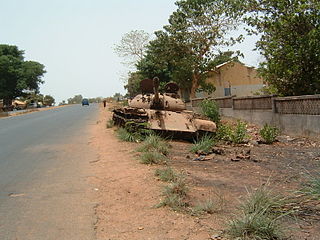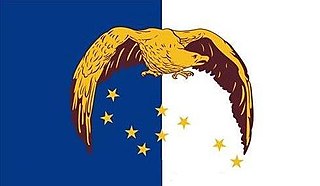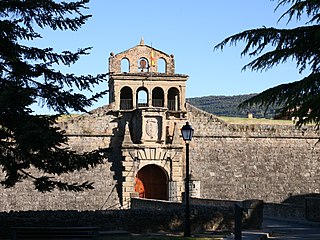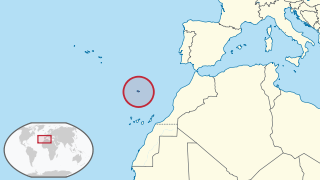
Rádio e Televisão de Portugal is the public service broadcasting organisation of Portugal. It operates four national television channels and three national radio channels, as well as several satellite and cable offerings.

Portugal did not initially form part of the system of alliances involved in World War I and thus remained neutral at the start of the conflict in 1914. But even though Portugal and Germany remained officially at peace for over a year and a half after the outbreak of World War I, there were many hostile engagements between the two countries. Portugal wanted to comply with British requests for aid and protect its colonies in Africa, thus clashes occurred with German troops in the south of Portuguese Angola, which bordered German South-West Africa, in 1914 and 1915. Tensions between Germany and Portugal also arose as a result of German U-boat warfare, which sought to blockade the United Kingdom, at the time the most important market for Portuguese products. Ultimately, tensions resulted in declarations of war, first by Germany against Portugal in March 1916.

The military history of Portugal is as long as the history of the country, from before the emergence of the independent Portuguese state.

The Guinea-Bissau Civil War was fought from 7 June 1998 to 10 May 1999 and was triggered by an attempted coup d'état against the government of President João Bernardo Vieira led by Brigadier-General Ansumane Mané. Government forces, backed by neighbouring states, clashed with the coup leaders who had quickly gained almost total control over the country's armed forces.

The Portuguese Navy is the naval branch of the Portuguese Armed Forces which, in cooperation and integrated with the other branches of the Portuguese military, is charged with the military defense of Portugal.

Machico is a municipality, parish and city in the southeast part of the island of Madeira, in the Autonomous Region of Madeira. The easternmost municipality on the island, it is also the third most populous area; its population was 21,828. The town, proper, had a population of 10,894 in 2001.

Domingos Augusto Alves da Costa Oliveira was a Portuguese general and politician.

Luís da Silva Mouzinho de Albuquerque was a Portuguese military officer, engineer, poet, scientist and politician, who distinguished himself during the Liberal Wars and in the conflicts that marked Portugal's history in the first half of the 19th century. He served as the Minister of the Kingdom during the liberal regency of Pedro of Braganza. This was the most prominent post inside the government at that time, which made him the Prime Minister of Portugal in all but name. He was also several times minister and deputy minister during the Constitutional Monarchical period. Among other offices, he served as Chief of the National Mint, captain-general and governor of Madeira, and inspector-general of public works. He was the grandfather of Joaquim Augusto Mouzinho de Albuquerque, a military officer and colonial administrator.
The Malê revolt is perhaps the most significant slave rebellion in Brazil. On a Sunday during Ramadan in January 1835, in the city of Salvador da Bahia, a small group of black slaves and freedmen, inspired by Muslim teachers, rose up against the government. Muslims were called malê in Bahia at this time, from Yoruba imale that designated a Yoruba Muslim.
The Vaccine Revolt or Vaccine Rebellion was a period of civil disorder which occurred in the city of Rio de Janeiro, Brazil.

The Azores Liberation Front, more commonly known as the FLA was a right-wing paramilitary organization with the goal of forceful independence of the Azores, appearing right after the Carnation Revolution and whose actions included violent attacks in 1975.

The Frente de Libertação do Arquipélago da Madeira, or FLAMA, was a right-wing terrorist paramilitary organisation from Madeira, whose main goal was to achieve Madeira's independence from mainland Portugal.
Television in Portugal was introduced in 1956 by Radiotelevisão Portuguesa, which held the nationwide television monopoly until late 1992. Regular broadcasting was introduced on March 7, 1957. Colour transmissions were introduced on March 10, 1980.
Aviation in the Azores is part of the greater history of aviation in Portugal, and involves the historical use of the archipelago of the Azores by North American, South American and European pioneers of aviation. The Azores is strategically located in the centre of the North Atlantic Ocean between the continents of North America and Europe, and has played a historical role in trans-Atlantic navigation. The three primary airfields of the Azores are:

The Communist uprising of 1935,, was a military revolt by leftist low-rank military against Getúlio Vargas' government, in the name of the National Liberation Alliance and with the support of the Brazilian Communist Party, which was back then called the Communist Party of Brazil, the uprising also had the support of the Comintern. It was the last of a series of Brazilian military revolts which began on 1922 under the name of tenentismo or the lieutenants revolts. Later, Vargas used it as a pretext for the Estado Novo establishment.

The 1936 naval revolt or Mutiny on the Tagus ships was a mutiny in Portugal that occurred on 8 September 1936 aboard the aviso Afonso de Albuquerque and destroyer Dão. It was organized by the Revolutionary Organization of the Fleet, a left-wing group with links to the Portuguese Communist Party. The mutineers intended to demand António de Oliveira Salazar's resignation and were apparently inspired by the ongoing Spanish Civil War.

The Jaca uprising was a military revolt on 12–13 December 1930 in Jaca, Huesca, Spain, with the purpose of overthrowing the monarchy of Spain. The revolt was launched prematurely, was poorly organized and was quickly suppressed. Its leaders were executed or imprisoned. However, the revolt sparked political upheavals that led to declaration of the Second Spanish Republic a few months later.
















